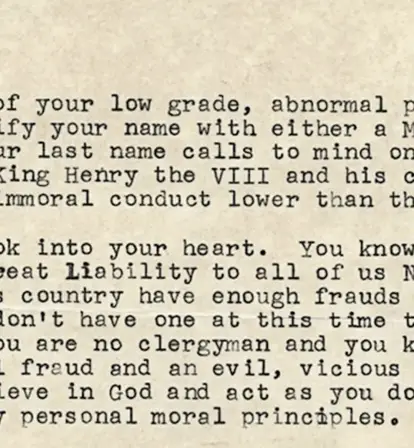In 1964, the FBI tried to blackmail Martin Luther King Jr. into ending his civil rights campaign with a letter that threatened to expose proof of his extramarital affairs — and apparently even encouraged him to kill himself.
It was 1964. Martin Luther King Jr. had already established himself as a household name and leader of the civil rights movement.
In the spring, King and the Southern Christian Leadership Conference (SCLC) had launched a massive campaign to end racial discrimination in St. Augustine, Florida — despite counter-demonstrations by the KKK. King’s tireless efforts led to the Civil Rights Act of 1964 being passed.
But sometime in the fall of that year, an anonymous package arrived on the doorstep of his wife, Coretta Scott King. The package contained a disturbing typewritten letter hinting at an audiotape that allegedly captured the civil rights leader’s extramarital sex life, including affairs with 40 women and proof that he once laughed while watching a pastor rape a woman.
Though King’s affairs and the improprieties that came with his fame had been casually noted before, this particular package went far beyond what common folk would have expected. The underlying message was clear: Stop leading this civil rights movement, or else: “You are done.”
King — along with his closest friends and associates — immediately suspected that the sender was from the Federal Bureau of Investigation (FBI). As shocking as it may be to hear today, he was absolutely correct.
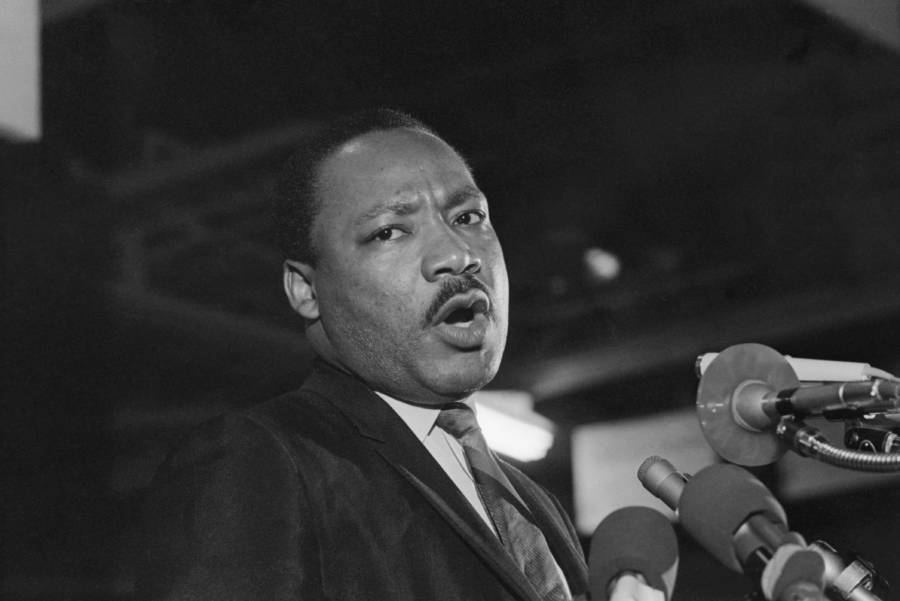
Bettmann/Contributor via Getty ImagesOn April 3, 1968, Martin Luther King Jr. delivered his famous “I’ve Been to the Mountaintop” speech in Memphis, Tennessee. The following day, at the nearby Lorraine Motel, King was assassinated by James Earl Ray.
Tragically, King was assassinated four years later in April 1968 by a lone gunman, James Earl Ray. But because of the way King was hounded by the FBI before his tragic death, many of his children have said they found it hard to believe that the one gunman was truly acting alone.
Meanwhile, the FBI’s blackmail tapes referenced in the letter remain sealed and classified until 2027. However, the memos are available today.
Martin Luther King Jr. And The FBI
Immoral intelligence strategies have a way of becoming classified and then declassified decades later after the fact, when the parties responsible for injustice have already died. This case is no different.
According to Insider, the “suicide letter” — as it’s come to be known — first surfaced in 1975. Filled with personal insults, barely-veiled threats, and oddly moralistic lecturing, it paints a dark picture of its sender — who appears to be encouraging King to kill himself.
Years later, the Senate’s Church Committee on intelligence confirmed that the letter was indeed sent by the FBI — as King had suspected. But why?
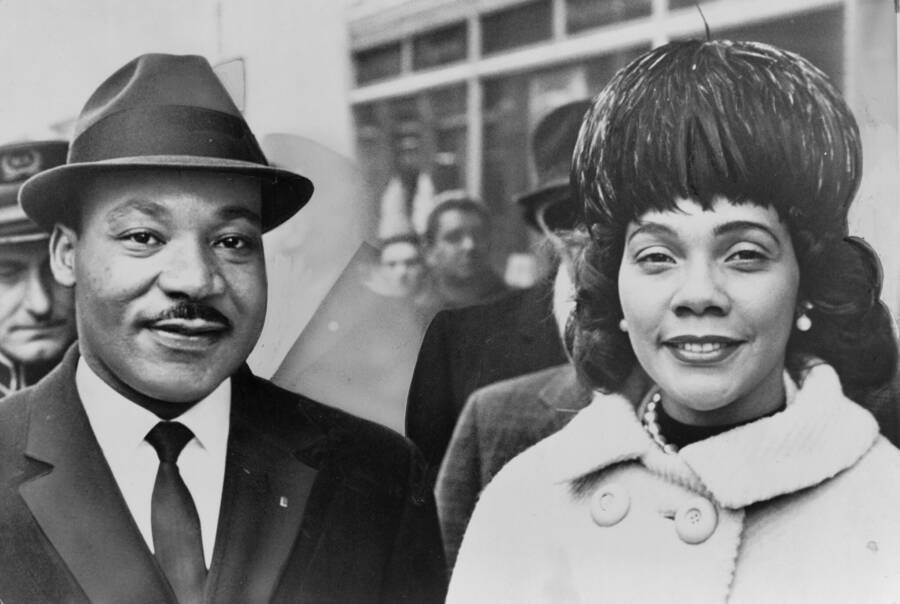
Herman Hiller / Library of CongressCoretta Scott King was the first one to open the infamous “FBI-King suicide letter.” 1964.
At the time, the FBI’s infamous director J. Edgar Hoover made no secret of his desire to bring King down and discredit his work during the civil rights movement. According to Stanford University’s King Institute, the FBI had been investigating the activist since the Montgomery bus boycotts of 1955.
But the hounding only increased in the early 1960s, when it was seen as a “national security matter” to the organization, especially when they learned that a former alleged Communist Party insider was a friend of King’s.
The efforts to neutralize Martin Luther King as an effective leader of the civil rights movement came at a precipitous moment for the man. By that point, he was leading a national movement that began with impoverished black Americans and then spread to people of all races.
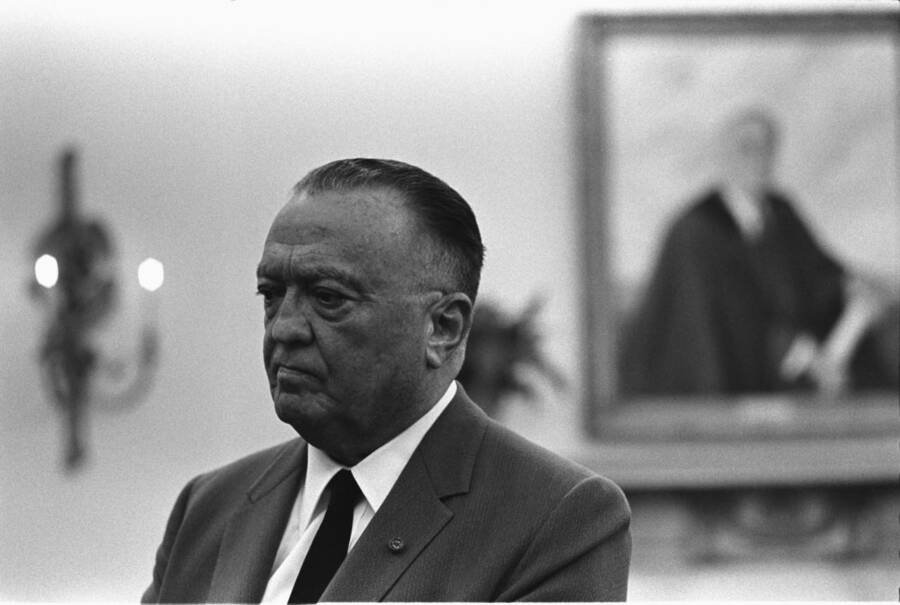
Wikimedia CommonsJ. Edgar Hoover was FBI director until the day he died in 1972. He hated King with a passion.
J. Edgar Hoover personally loathed King, and believed his entire position was rooted in communist propaganda. At one point, he even called him “the most notorious liar in the country.”
It is presumably no coincidence that this hostile stance, and the FBI’s horrific letter, came a few months after King’s comments on the agency in April 1964.
The FBI was “completely ineffectual in resolving the continued mayhem and brutality inflicted upon the Negro in the Deep South,” said King.
Though the FBI was founded in 1908 and originally intended to investigate criminals who evaded prosecution by passing over state lines, that all changed under President Roosevelt in the 1930s.
He ordered agents to focus on “subversives” in the country, and Congress helped pass laws that gave the FBI more breadth to do so.
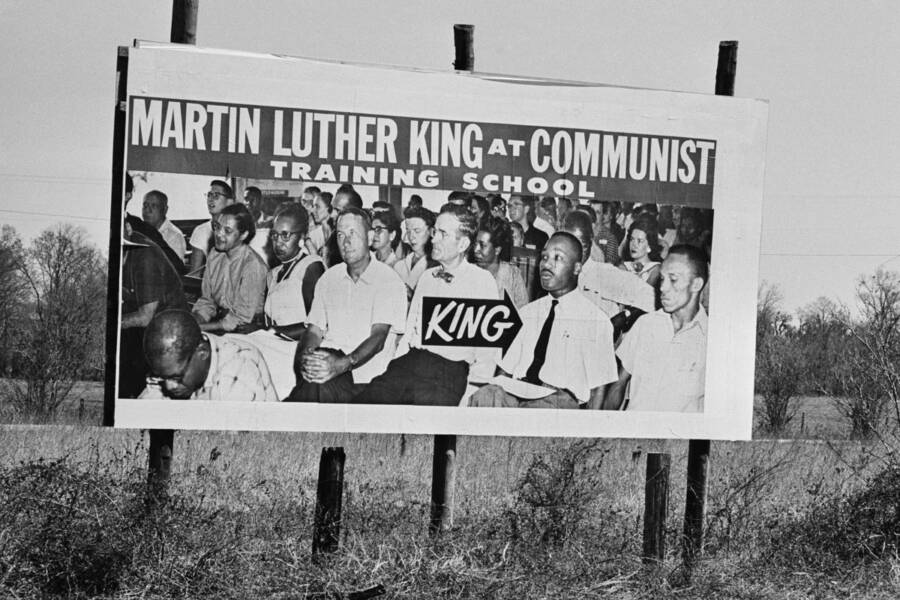
Wikimedia CommonsThis billboard may have been a direct result of the FBI’s efforts to undermine King.
It was February 1962 when Hoover told Attorney General Robert Kennedy that one of King’s closest aides, Stanley Levison, was “a secret member of the Communist Party.”
Hoover instructed agents to find subversive blackmail on King. And in October 1963, Robert Kennedy authorized wiretaps on King’s home and the SCLC’s offices.
Under the FBI’s counterintelligence program called COINTELPRO, King was put under surveillance that allegedly produced evidence of his extramarital affairs. This was one year shy of the arrival of the infamous letter.
The FBI’s “Suicide Letter” To King
A copy of the letter was published by The New York Times in 2014 by Yale historian Beverly Gage. The letter’s since-popularized name “FBI-King suicide letter” derives from the fact that it is littered with references to King’s end.
The typewritten document repeatedly mentions that he is “done,” and even states that his Nobel Prize “and other awards will not save you.” It calls King a “fraud,” and alludes to his “dirt, filth, evil, and moronic” utterances captured on audiotapes.
Perhaps most disturbing, the content of the audiotapes allegedly contains evidence King “looked on and laughed” as a pastor raped a woman.
Disclosure of this material would have obviously tarnished his reputation. Not only would it have derailed the short-term goals of his activism, but it could have also jeopardized the overarching message of the civil rights movement as a whole.
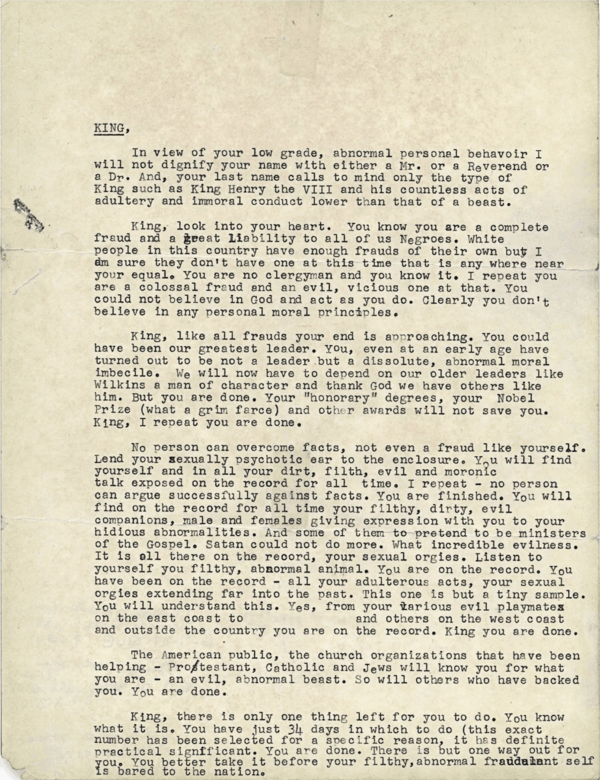
Wikimedia CommonsThe letter contained around 500 words, thinly-veiled threats, and repeated urging for King to end his movement.
The letter claims to be from a black supporter of the civil rights movement, and accuses King of “immoral conduct lower than that of a beast,” and being “a great liability to all of us Negroes.” It also instructs King to listen to the enclosed tape, which contains a recording of his “sexual orgies.”
It warns King that he has “just 34 days.” It then concludes: “There is but one way out for you. You better take it before your filthy, abnormal fraudulent self is bared to the nation.”
According to Pulitzer Prize-winning King biographer David J. Garrow, media outlets turned him down when he initially offered to share the story of the “suicide letter.”
He had spent months wading through an FBI “data dump” of 50,000 web links, and found out that the FBI bugged King’s room at the Willard Hotel.
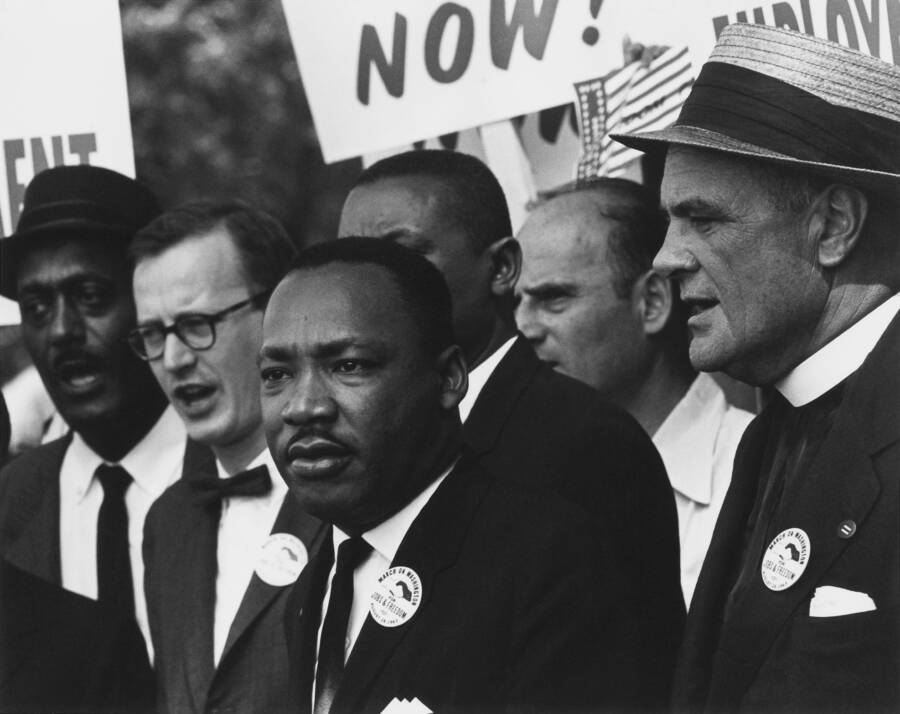
Wikimedia CommonsKing at the 1963 Civil Rights March in Washington, D.C.
One of the memos shows that the FBI thought that King was “highly susceptible to coercion and possible blackmail,” and that Hoover personally signed off on the effort due to his personal hatred of the man.
Another document shows that Sullivan ordered a copy of the tapes to be sent to King in 1964.
By all accounts, King handled the matter internally, and refused to be compromised. Unfortunately, he would be murdered within four years of this incident — though a collective deep-dive into the FBI’s ruthless efforts only garnered more steam as the decades rolled on.
The FBI’s Martin Luther King Tapes And Subsequent Revelations
According to Richard Gid Powers’ Broken: The Troubled Past and Uncertain Future of the FBI, a group of activists called the Citizens’ Commission to Investigate the FBI burglarized one of the agency’s offices in Media, Pennsylvania on March 8, 1971.
Some of the classified documents they obtained, albeit illegally, publicly revealed COINTELPRO for the very first time. Once these were shared with major newspapers and members of Congress, investigations into the intent began in 1975 with the Church Committee hearings.

Wikimedia CommonsThe small FBI field office in Media, Pennsylvania.
This revealed that a copy of the “suicide letter” was found in Sullivan’s work files. As for the referenced audio tapes of King, which were revealed during the hearings, SCLC leaders tried to obtain and destroy them.
According to The Deseret News, federal judge John Lewis Smith denied the request, and ordered that the tapes remain sealed until 2027 and placed in the National Archives.
Since then, some have fought on either side of the issue. According to Time, Republican Senator Jesse Helms tried to reveal the evidence as part of a plan to vanquish Martin Luther King Jr. Day in 1983.
Meanwhile, the Martin Luther King Jr. Records Collection Act was introduced by Democratic Representatives in 2006 — but it was never enacted.
According to Politico, King associate Ralph Abernathy did confirm in his 1989 memoir that the leader had spent the night before his death with a mistress.
The hearings, meanwhile, confirmed some things about the FBI — that they were excessive regarding surveillance on King, they were fixated on his sex life, and they may have even tried to make him commit suicide.
Ultimately, King’s alleged complicity in rape has yet to be officially confirmed or denied. Whether or not 2027 reveals further personal flaws of the civil rights leader is uncertain. However, the greatness of his movement to help those in need remains steadfast to this day.
After learning about the FBI’s Martin Luther King tapes and the ominous “suicide” letter delivered to his wife, learn 10 things you didn’t know about Martin Luther King. Next, read about the one and only meeting of Martin Luther King and Malcolm X.
